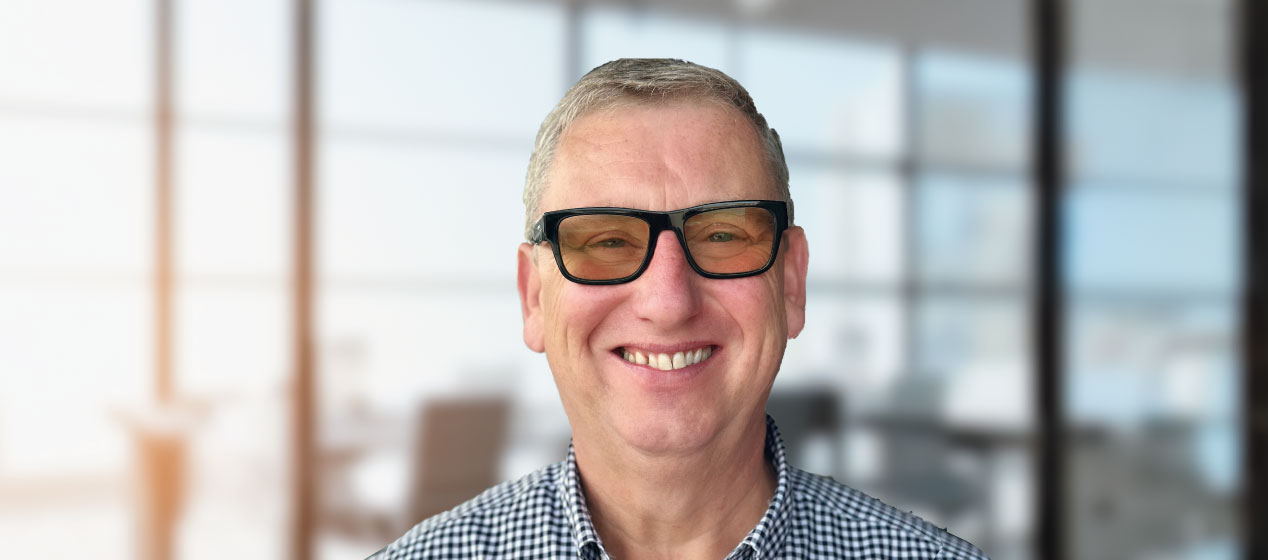NEOL’s expert interviews: David Simpson
Author: NEOL
With over 25 years of experience in the maritime, offshore, and renewable energy sectors, David Simpson has built an extensive career in fleet maintenance, sustainable lubrication technologies, and business development. From his early days in the Royal Navy to leadership roles in fleet management and eco-friendly lubrication solutions, David has witnessed first-hand the evolving challenges and innovations shaping the maritime industry.
As the Business Development Advisor for Marine & Offshore at NEOL, David is focused on advancing sustainable tribology solutions that enhance efficiency while reducing environmental impact. In this conversation, he shares his insights on the key challenges facing the maritime sector—from decarbonization and regulatory pressures to the role of high-performance lubricants in improving efficiency and sustainability.
Q: David, your career in maritime spans over 25 years—what inspired you to enter this industry, and how has your journey evolved?
David Simpson: I started my career in the Royal Navy as a Marine Engineer, where I was already dealing with environmental regulations as early as 1998. Even then, we had systems in place to reduce marine pollution—sewage treatment, waste recycling, incinerators, and oily water separators to ensure discharge stayed below 15ppm of oil.
It was during my time as Fleet Manager at Seajacks that environmentally acceptable lubricants began gaining serious attention. They became a key consideration for decision-makers when choosing consumables.
Later, I joined a U.S.-based biotech company focused entirely on green technologies. That role really opened my eyes to the scale of the environmental challenges facing the maritime and offshore sectors. It pushed me to get fully involved in helping operators and OEMs make smarter, more sustainable choices—ones that align with both regulatory demands and long-term environmental goals.
Q: The maritime sector is under increasing pressure to decarbonize. What do you see as the biggest challenges in achieving this transformation?
David Simpson: Much of the focus is rightly on future fuels and engines as key drivers of decarbonization. But while those long-term solutions are essential, businesses also need to prioritize “right now” strategies that can bridge the gap between today and 2030/2050.
That means looking beyond fuels—targeting emissions reductions across entire operations, from lubricant technologies to vessel efficiency upgrades. There’s also a pressing need for stronger lobbying to push for green incentives and tax credits that support sustainable investments.
The biggest challenge is making the right decisions, backed by solid due diligence. Operators need to decarbonize their fleets in ways that minimize financial impact. Some upgrades not only reduce emissions but can also offer carbon credit benefits and create real marketing value—helping companies stay ahead of the competition.
Q: Beyond decarbonization, what are the other major challenges currently facing the maritime and offshore industries? How are companies adapting?
David Simpson: In conversations with industry peers, it’s clear that navigating the growing complexity of regulatory frameworks is a major challenge. The IMO’s Carbon Intensity Indicator (CII) and the EU Emissions Trading System (EU ETS) are top of mind. While there’s broad agreement on the need to reduce emissions, strategies for achieving compliance vary widely. Some shipowners are proactively investing in efficiency upgrades, while others are struggling to balance sustainability goals with financial pressures.
This is no longer just about how we build new ships or what equipment we install—it’s about how we manage existing vessels in service. Older ships and traditional operations risk exceeding emissions allowances or falling into non-compliant CII ratings, which can lead to carbon taxes and financial penalties under systems like the EU ETS.
From my time as Fleet Maintenance Manager at Seajacks, I saw how sudden regulatory changes could force shipowners into difficult positions. When the Ballast Water Treatment regulations came into play, many fleet managers delayed action because of the high upfront costs and lack of immediate return. But I chose to act early.
We took a proactive approach—researching available technologies, assessing their operational impact, and selecting systems that minimized disruption. We considered everything from equipment footprint and power needs to crew training and maintenance. This allowed us to plan, budget, and implement changes without getting caught in the supply chain bottlenecks that hit later.
The lesson was clear: early action and strategic planning pay off. Those who prepare ahead of deadlines avoid last-minute chaos and unexpected costs.
That same principle applies now, as shipowners face pressure to adopt greener technologies—whether it’s alternative propulsion systems, sustainable lubricants, or efficiency upgrades. Companies that act now will get the best solutions, avoid delays, and stay compliant without sacrificing performance. In this industry, waiting is no longer a strategy—the companies leading the transition are the ones making smart, timely investments.
Q: From your experience, how are lubrication technologies impacting efficiency and sustainability in maritime and offshore operations?
David Simpson: Lubrication technology has come a long way. When I first looked into environmentally acceptable lubricants, they were often seen as a compromise—less effective than traditional petroleum-based options. That’s no longer true.
Today’s high-performance lubricants not only meet strict environmental standards but also outperform many conventional products. The shift isn’t just about biodegradability—it’s about using renewable, sustainable ingredients to reduce environmental impact while improving mechanical efficiency, fuel economy, and the longevity of critical equipment.
Every shipowner is looking for ways to make their equipment run more efficiently. And with greater efficiency comes lower fuel consumption—which directly translates to reduced emissions and improved sustainability.
Q: What role do you see CuGlide™ playing in the future of marine lubrication? How does it stand out from traditional solutions?
David Simpson: Any solution that helps reduce emissions has a real-world impact—and that includes lubricants. While future fuels are central to long-term decarbonization, technologies like high-performance lubricants offer immediate, measurable gains in efficiency.
That’s where CuGlide™ stands out. It’s a next-generation lubricant that improves both mechanical and fuel efficiency, directly reducing emissions. Unlike conventional lubricants, CuGlide™ delivers no- and low-SAPS benefits, minimizing ash buildup and extending engine life without sacrificing performance. It combines high performance with strong environmental credentials—something that’s still rare in the marine sector.
On top of that, CuGlide™ has a rejuvenating effect on engine wear components. It helps extend drain intervals, prolong engine life, and cut down on maintenance costs. It’s a one-stop solution that supports fuel efficiency, emissions reduction, and long-term operational savings—delivering both environmental and bottom-line benefits.
Q: Looking ahead, how do you see the maritime industry evolving over the next 5-10 years? What are the key trends shaping its future?
David Simpson: The maritime industry will continue its shift toward decarbonization and green shipping. Alternative fuels, hybrid systems, and electrification will gain traction where practical, but improving the efficiency of existing fleets will remain just as critical.
One growing challenge will be ensuring supply chain resilience—particularly around the global availability and distribution of new fuel types.
Green ports will also become a priority. Investments in shore power, electrification, and digitalization will be key to reducing congestion, improving turnaround times, and cutting emissions.
AI-driven smart shipping is another major shift on the horizon. Automation, real-time emissions tracking, and self-optimizing vessels will transform fleet management. Future ship designs will feature predictive maintenance, automated navigation, and digital twins—virtual models that help operators optimize performance and prevent failures in real time. These innovations will reduce costs while boosting safety and sustainability.
Success will depend on a balanced strategy. Long-term investments in future fuels and ship designs must be matched by short-term gains—through better lubricants, improved engine performance, and digital tools. The next decade belongs to companies that act early, investing strategically in both new builds and upgrades to stay competitive in a fast-changing regulatory landscape.
Q: What excites you most about joining NEOL? How do you see the company contributing to innovation in the marine sector?
David Simpson: NEOL is a startup with a game-changing technology—it’s tackling a problem that has remained unsolved for decades with a solution that has been researched, tested and proven over the same time scale.
What sets NEOL apart is its commitment to bridging the gap between theory and practice. The company isn’t just talking about innovation—it’s investing in real-world validation to prove CuGlide™ works in demanding marine environments.
That kind of follow-through is what the industry needs: not just promising ideas, but proven technologies backed by rigorous testing. It’s this level of commitment that makes real change possible—and that’s what excites me about being part of NEOL.
Q: If you had to give one piece of advice to shipping and offshore operators looking to improve efficiency, what would it be?
David Simpson: Efficiency, sustainability, and profitability need to move together. You can’t sacrifice one for the others—not if you want to stay competitive and future-proof your operations.
There’s no silver bullet or risk-free solution. My advice is simple: stay informed, keep an eye on emerging technologies, and invest with intent. A balanced, diverse approach—using multiple efficiency tools—will deliver short-term gains while setting you up for long-term success.
The companies that adopt innovative technologies early will lead the pack. They’ll have more efficient, compliant, and financially sustainable fleets—and a clear edge over the competition.

